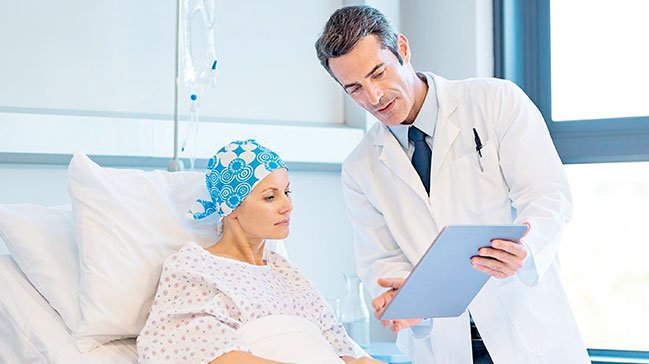
Overview
Cancer is among most important health problems of our age…
Cancer is one of the most important health problems of our age. Due to the increasing incidence, its significance will boost in the near future. Countries develop their cancer policies benefiting from international experience and they implement unique practices. In our country, it is necessary to identify cancer cases that can be diagnosed early, to control the types of cancer, to inform the public about cancer through in-service training and public education and to reduce the morbidity and mortality of cancer. The screening for breast, cervix and colorectal cancers - which are the three cancers recommended to be screened by the World Health Organization - has been standardized by the Ministry of Health in line with our national screening standards. Actually, when the stages that these three cancers are diagnosed are taken into consideration, it is revealed out that more than half of the cases were diagnosed at advanced stages. Early diagnosis can lead to a significant decrease in morbidity and mortality and even eradication of all these three cancers. However, the ability to gain these outcomes is as much related with post-screening diagnostic process as the screening program. Therefore, Istanbul Health Practice and Research Center of Başkent University has opened the Advanced Diagnosis and Treatment Center of Cancer in Istanbul Hospital in order to pioneer this important issue in our country. Cancer is the uncontrolled or abnormal division and growth of cells due to DNA damage. Although approximately 10,000 mutations occur in our body (in DNA) per day, our immune system scans our bodies in every millisecond and destroys cancerous cells. Healthy body cells have the ability to divide. They use these abilities to regenerate dead cells and repair injured tissues. But these capabilities are also limited. They can't be divided forever. Every cell has a certain number of divisibility throughout its lifetime. A healthy cell has the ability to know when and where it can divide. However, cancer cells lose the control; they begin to divide and grow in an uncontrolled manner. Cancer cells accumulate and form tumors that may compress, infiltrate or destroy healthy tissues. If cancer cells detach from the tumor, they may travel to other parts of the body through blood or lymph circulation. They form tumor colonies at the destination and they continue to divide and grow. The spread of cancer in this way to the other parts of the body is called metastasis. The cancers are classified according to the organ, where they begin, and how they look under microscope. Different types of cancers grow at different rates, they show different spread patterns and they respond to different treatments. Therefore, the treatment of cancer patients depends on the type of cancer. Not every cancer has the same structure.
Only a small number of mutated cells in the body cause cancer. There are many reasons for this fact:
- Mutated cells are less able to survive than normal cells. That's why they die.
- The majority of mutated cells still have a normal feedback control mechanism (“Tumor suppressor genes”) that prevents overgrowth. Thus, very few of the mutant cells that survive transform into cancerous cells.
- Often, these cells with cancer potential are destroyed by the body's immune system before they grow and form cancer.
Lung Cancer;
- Long-lasting cough
- Blood in phlegm
- Shortness of breath
Skin Cancer;
- Non-healing wounds
- Changes in shape and color of nevus and warts
- Sudden-onset nevus and warts
Breast Cancer;
- Palpable lump in breast
- Inward retraction of nipple
- Nipple discharge
- Changes in breast shape
Mouth Cancer;
- White or red areas in or around the mouth
- Sensitive, irritated, raised or thickened areas in the mouth
- Recurrent bleeding in the mouth or throat
- Hoarseness or feeling of an object in the throat that cannot be swallowed
- Chewing and swallowing difficulty
- Difficulty in tongue and chin movements
- Sensorial deficit, numbness in the tongue or other parts of the mouth
- Swelling in lower or upper jaw and resultant negative consequences in dental prosthesis
- Mouth cancer lesions are painless at the initial stage, but the pain arises as the cancer progresses and causes damage to healthy oral tissues
Endometrial Cancer;
- Bleeding after menopause
- Vaginal discharge with unknown cause
- Irregularities or abnormal bleeding, menstrual bleeding which lasts more than one month
- Abdominal swelling
Colon Cancer;
- Changes in defecation habits and rectal bleeding
- Abdominal pain
- Abdominal mass lesion
- Weight loss
Prostate Cancer;
- Frequent urination (especially at nights)
- Interrupted, painful and leaky urination
- The feeling of inability to empty the bladder
- Poor urinary continence
- Reduction in urine stream
First, we have to learn not to be afraid of cancer. Fear prevents doctor visits and consequent chance of cure. Only the doctors have the right and the responsibility to interpret the symptoms. It is imperative to know symptoms of cancer and to see a doctor immediately if you feel any of these symptoms. Even if we do not have any discomfort, we should have a general health check-up once a year. We should remember that cancer is a curable disease. The rate of recovery is directly related with the early detection of cancer.
Cancer Screening Packages
Female Cancer Screening Packages:
- Age above 50
- Age above 40
- Age below 40
Male Cancer Screening Packages:
- Age above 50
- Age below 50






